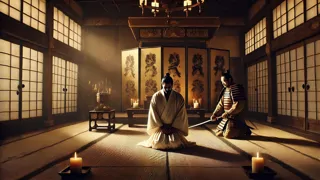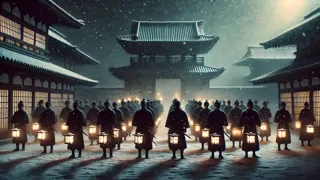Introduction
Amid the snow-clad rooftops and bustling alleyways of Edo-period Japan, whispers of honor and vengeance drifted through the winter air. It was an era shaped by strict codes, where the word of a samurai was his soul and where the smallest insult could trigger ripples of fate that would alter the course of history. Among the myriad tales that unfolded under the watchful gaze of Mount Fuji, none echoed through the centuries with such haunting intensity as the saga of the forty-seven ronin. Their story was not merely one of swords and blood, but of unbreakable loyalty and the ultimate cost of justice.
In those days, the shogunate ruled with an iron hand, and the code of bushido, the way of the warrior, held sway over every samurai’s heart. Lords and vassals moved like pieces on a great chessboard, their destinies shaped by politics, pride, and ancient tradition. In the bustling city of Edo, where merchants traded silks and rice, and lanterns glowed in the evening mist, the fate of a proud lord named Asano Naganori would set into motion a chain of events that would challenge the very fabric of Japanese society.
When Lord Asano, a daimyo of Ako, was humiliated by the scheming court official Kira Yoshinaka, a clash of personalities sparked a tragedy that would leave forty-seven samurai masterless—ronin, adrift and dishonored. The shogun's decree was swift and unyielding; Asano was ordered to commit seppuku for his crime, his lands seized, his retainers dismissed. Yet in the shadows of Edo, beneath the seemingly quiet surrender, a flame of purpose burned in the hearts of his loyal men. Their grief turned to resolve, and their shame became a banner under which they would unite.
This is the story of Oishi Kuranosuke, the wise and steadfast chief retainer, and his band of ronin who, for two long years, concealed their intentions from prying eyes. They endured poverty, ridicule, and suspicion, their true purpose hidden beneath masks of drunkenness and despair. The world saw men broken by defeat, but within them stirred an unyielding spirit, determined to restore their lord’s honor at any cost. In the silent snowfall of a fateful night, they would rise as one, carrying the legacy of bushido on their shoulders and etching their names into the eternal memory of Japan.
Step now into the lantern-lit streets and frostbitten gardens of Edo, and witness the legend of the forty-seven ronin—where loyalty and vengeance cross swords, and the meaning of justice is written not in words, but in deeds that echo through time.
The Fall of Ako: A Lord's Humiliation and the Birth of Ronin
The tale began in the hallowed halls of Edo Castle, where the pulse of Japanese power thrummed beneath gilded screens and polished tatami mats. Lord Asano Naganori, daimyo of Ako, was summoned to the capital as a mark of favor, instructed to assist in hosting imperial envoys. For a rural lord, it was both an honor and a challenge; the city’s courtly customs were labyrinthine, and at their heart waited Kira Yoshinaka, the master of protocol, whose reputation for cunning was as sharp as any blade.

Kira, intent on extracting lavish gifts and bribes from those he instructed, met Asano’s earnestness with scorn. Asano, young and idealistic, refused to yield to the culture of corruption. Each day brought a new slight—insults couched in etiquette, humiliations disguised as instruction. Among the lacquered pillars, tempers smoldered like embers beneath ash. The breaking point arrived when Kira, in a fit of disdain, ridiculed Asano before his peers, tarnishing his honor in the very heart of the shogun’s palace.
Unable to bear such shame, Asano’s sword flashed in the forbidden corridors. Though his attack wounded only pride, not flesh, the consequences were swift and merciless. The shogun’s justice was absolute: Asano was ordered to commit seppuku, a ritual suicide that demanded dignity even in death. His lands and fortune were seized, his family disgraced, and his samurai cast out. In a single stroke, forty-seven men—among them Oishi Kuranosuke, his chief retainer—became ronin, masterless in a world that valued loyalty above all.
The autumn wind carried news of Asano’s death across the country. In the narrow streets of Ako, banners bearing his crest fluttered in silence, their meaning transformed from pride to mourning. The castle gates were closed, samurai armor stowed away, and the retainers faced a dilemma as old as bushido itself: accept defeat and scatter, or stand together against the impossible odds of vengeance. The law forbade retaliation. Any open move against Kira would invite certain death—not just for themselves, but for their families. And yet, as the leaves fell, so too did hope for forgiveness or mercy. What remained was an ember of purpose.
Oishi Kuranosuke gathered the men in secret. In the flickering light of a humble teahouse, he laid before them the path they might take. “We are forbidden from action by law,” he said, voice low but steady. “But is a samurai’s duty to law or to his lord’s memory? Our master was wronged, his spirit cries for justice. If we act, we risk everything—not just our lives, but our very names. If we do nothing, we live as ghosts, haunted by dishonor.”
The answer was not forged in that moment, but in the silent determination that flickered across each face. They would dissolve into the shadows, hide their intentions beneath outward defeat, and wait. They would become merchants, farmers, drunkards—even beggars—if it meant lulling their enemies into complacency. They would bear mockery and poverty, nursing their resolve as winter crept over Edo. The fall of Ako was not the end, but the beginning of a long and perilous road, one paved with secrecy, sacrifice, and an unyielding hope that justice would one day be reclaimed.
Years in Shadow: The Ronin’s Sacrifice and Secret Resolve
As the seasons turned and memories of Lord Asano faded from the gossiping mouths of Edo’s elite, the forty-seven ronin scattered like leaves before the wind. Each vanished into obscurity, assuming the roles of defeated men—farm laborers, peddlers, drunks, gamblers. They sold their swords and wore plain robes, blending into the city’s crowded markets and smoky taverns. In public, they quarreled or staggered through alleys, inviting the scorn of neighbors who muttered about cowardice and wasted honor.

Yet beneath these masks lay a design of exquisite patience. Oishi Kuranosuke, the leader whom all trusted, played his part with unsettling skill. He moved to Kyoto, pretending to abandon all thoughts of vengeance. He frequented brothels and drank himself into oblivion in the red-light district, so convincingly that even Kira’s spies dismissed him as broken. But every night, after the city’s revels had faded, Oishi would slip through silent streets to secret gatherings. There, the remaining ronin would assemble in the dimness, voices hushed but eyes burning with purpose. They mapped Kira’s movements, watched his household grow lax with each uneventful month, and sent coded messages by courier across the provinces.
Life among the shadows tested every man. Some faced hunger so sharp it gnawed at their will. Others endured insults from former allies or were spurned by family who could not understand their descent into disgrace. Still, none wavered. Their bond was not held by oaths alone, but by a shared memory—the vision of Lord Asano’s final bow, his words echoing in their dreams. Even as they feigned surrender, the ronin sharpened their resolve with every passing hardship.
Oishi’s feigned descent reached its zenith one winter evening. As he stumbled drunkenly through the streets, a street tough insulted him. Instead of striking back, Oishi fell to his knees and wept. The news spread like wildfire—if the chief retainer himself had surrendered to despair, then surely there was nothing to fear from Ako’s defeated men. Kira’s household relaxed their vigilance. Guards grew complacent; gates were left unbarred.
But in truth, the ronin’s preparations neared completion. Weapons were smuggled into Edo in crates of charcoal and rice. Secret messages summoned far-flung comrades back to the city. Each man prepared his affairs in silence—writing farewell letters, ensuring their families would not suffer retribution. On a night when the snow fell thick and silent, Oishi called his men together in a humble inn at the city’s edge. There were no grand speeches, only quiet resolve etched into every face. They bowed deeply, honoring their master one final time.
In that moment, each man’s fate was sealed. Whatever awaited them—death or triumph—they would meet it together. Their years in shadow had forged a brotherhood unbreakable by law or fear, united by a single purpose: to reclaim their lord’s honor, and to prove that the spirit of bushido could burn even in the darkest night.
Night of Reckoning: The Attack on Kira’s Mansion
The city lay beneath a deep hush, swaddled in snow that muffled every sound except for the crunch of careful feet. The appointed night had arrived—December 14th, when all of Edo slumbered under winter’s heavy blanket. The forty-seven ronin moved as one through alleys and across rooftops, dressed not in ornate armor but in black and brown, each man carrying a soul as heavy as his blade.

Kira’s mansion sprawled on the city’s edge, its gates guarded but not impervious. Oishi divided his men into two groups: one to storm the front, another to slip through the rear. Armed with swords and courage born of years’ sacrifice, they advanced in silence. At Oishi’s whispered command, their assault began. Doors splintered beneath hammer blows, and shouts rang through the house as startled guards scrambled to defend their master. But discipline held; the ronin fought with grim precision, subduing their foes without needless slaughter.
The chaos was lit by lanterns and the sharp gleam of steel. In kitchens and courtyards, loyal servants tried to barricade doors. The ronin pressed on, searching every room for Kira—yet he was nowhere to be found. With the clamor rising, Oishi ordered the house searched from eaves to cellars. Snow filtered through shattered windows as the ronin methodically subdued resistance.
At last, in a hidden courtyard shed, they found him: Kira Yoshinaka, shivering behind bundles of firewood, his white face contorted in fear. Oishi approached with calm dignity. He knelt and offered Kira a dagger, inviting him to die by his own hand and preserve some shred of honor. But Kira was paralyzed by terror; he refused, unable even to meet the eyes of those who had come for justice. Oishi, seeing no other path, delivered the fatal blow himself.
With the deed done, the ronin gathered Kira’s head, wrapped it in fine cloth, and made their way through silent streets to Sengaku-ji Temple. As dawn colored the sky with pale gold, they knelt before Lord Asano’s grave. In solemn procession, they washed Kira’s head and presented it at the tomb, declaring that justice had been served. There were no cheers—only quiet tears and prayers whispered into the morning air.
The news swept through Edo like wildfire. Ordinary people flocked to Sengaku-ji, drawn by awe and sorrow. The ronin knelt in silent rows, awaiting their fate. They had broken the law for a higher cause—a paradox that shook even the shogun’s court. But in the end, the edict came: the ronin would be allowed to die as samurai, committing seppuku rather than facing an ignoble execution. Their sacrifice would forever change the face of loyalty in Japan.
Conclusion
The forty-seven ronin’s fate was sealed not on the battlefield but in the quiet of Sengaku-ji’s temple grounds. One by one, they met their end with dignity—writing final poems, bowing before each other, and embracing death as the final act of loyalty. Their graves soon lined the temple path, marked not by grandeur but by the humble offerings of townsfolk who saw in their sacrifice a reflection of something eternal.
In time, their story transcended law and politics, becoming a legend that shaped the soul of Japan. Plays and poems immortalized their deeds, children whispered their names on snowy nights, and warriors found new meaning in the path of bushido. The shogunate may have ended their lives, but it could not erase their legacy. The tale of the forty-seven ronin endures as a testament to the power of loyalty and the price of justice—a reminder that true honor is not bestowed by decree, but earned through sacrifice and unwavering resolve.


















